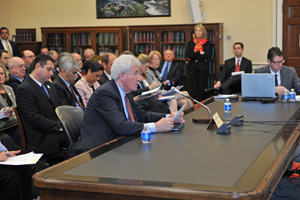USIP President Testifies Before Congress
Dr. Richard H. Solomon, president of the U.S. Institute of Peace, testified on the important role of USIP in national security affairs.

 Chairwoman Granger, Ranking Member Lowey and other subcommittee members: Thank you for this opportunity to testify in support of the President’s request for the U.S. Institute of Peace for fiscal year 2012. We appreciate the subcommittee’s long-standing support of our work.
Chairwoman Granger, Ranking Member Lowey and other subcommittee members: Thank you for this opportunity to testify in support of the President’s request for the U.S. Institute of Peace for fiscal year 2012. We appreciate the subcommittee’s long-standing support of our work.
We are living in a time of profound change in international affairs. America faces daunting threats to our political interests abroad, our economic well being and our national security - and these challenges only begin with the wars we are currently fighting.
In this context, the Institute has come to play a significant role in our country’s national security affairs. Our staff is on the ground in zones of conflict - Iraq, Afghanistan and Sudan to name three – and their work is saving lives and money. The conflict management techniques that we’ve developed are helping our government adapt to these new challenges in cost-effective ways.
We understand the importance of getting our national budget deficit under control. Thus, our fiscal year 2012 request, as with 2011, is a substantial decrease from our 2010 appropriation.
Our work does not duplicate the activities of the Departments of State and Defense. These agencies have repeatedly called on us for support where our mission brings special skills that help them advance their missions. Secretary of State Hillary Clinton recently stated to this subcommittee that the Institute was “formed by Congress to operationalize America’s commitment to peace.”
Our programs bridge the divide between the government’s civilian and military agencies. We developed the doctrine that is helping these agencies deal with the transitions in Iraq and Afghanistan; and this doctrine – as we speak - is helping our government prepare for stabilizing the current situation in Libya. Under Secretary of Defense Michele Flournoy recently wrote to congressional leaders that the Institute “serves a critical function that is not elsewhere available in the DoD or in other departments and agencies of the U.S. Government,” and its work “pays national security dividends far greater than the sums required to fund it.”
 The Institute of Peace is not a "think tank." Unlike a think tank, our work is very operational. Our staff is on the ground and at risk in multiple conflict areas. We train U.S. civilian and military personnel headed to these conflicts.
The Institute of Peace is not a "think tank." Unlike a think tank, our work is very operational. Our staff is on the ground and at risk in multiple conflict areas. We train U.S. civilian and military personnel headed to these conflicts.
Our efforts save lives and money. For example, our work on electoral violence prevention in Sudan just prior to the January referendum helped avert a civil war there. In Iraq, USIP negotiators mediated an agreement between warring parties in the district known as the “triangle of death.” The agreement led to a reduction in U.S. troop fatalities from what had been up to 12 per month down to zero, and allowed the Army to redeploy two battalions, thus saving the taxpayers $2.2 billion per year in that area alone.
Finally, when Congress created the Institute, it did not want our work to be influenced by the agendas of private individuals or organizations, or by foreign money. Thus, it restricted the funding of our programmatic work to Congressionally appropriated resources only. Our effectiveness as a center of innovation in conflict management is critically based on our funding as a federal entity. Our agenda is the nation’s agenda, and our work is subject to oversight by Congress and our Senate-confirmed, bipartisan Board of Directors.
In conclusion, I believe that our work warrants a level of Congressional funding that will enable us to continue saving lives and money for our country as we confront a very challenging international environment. I ask that a letter from former top American ambassadors in support of USIP be included in the record. I look forward to any questions you might have.
Thank you.



